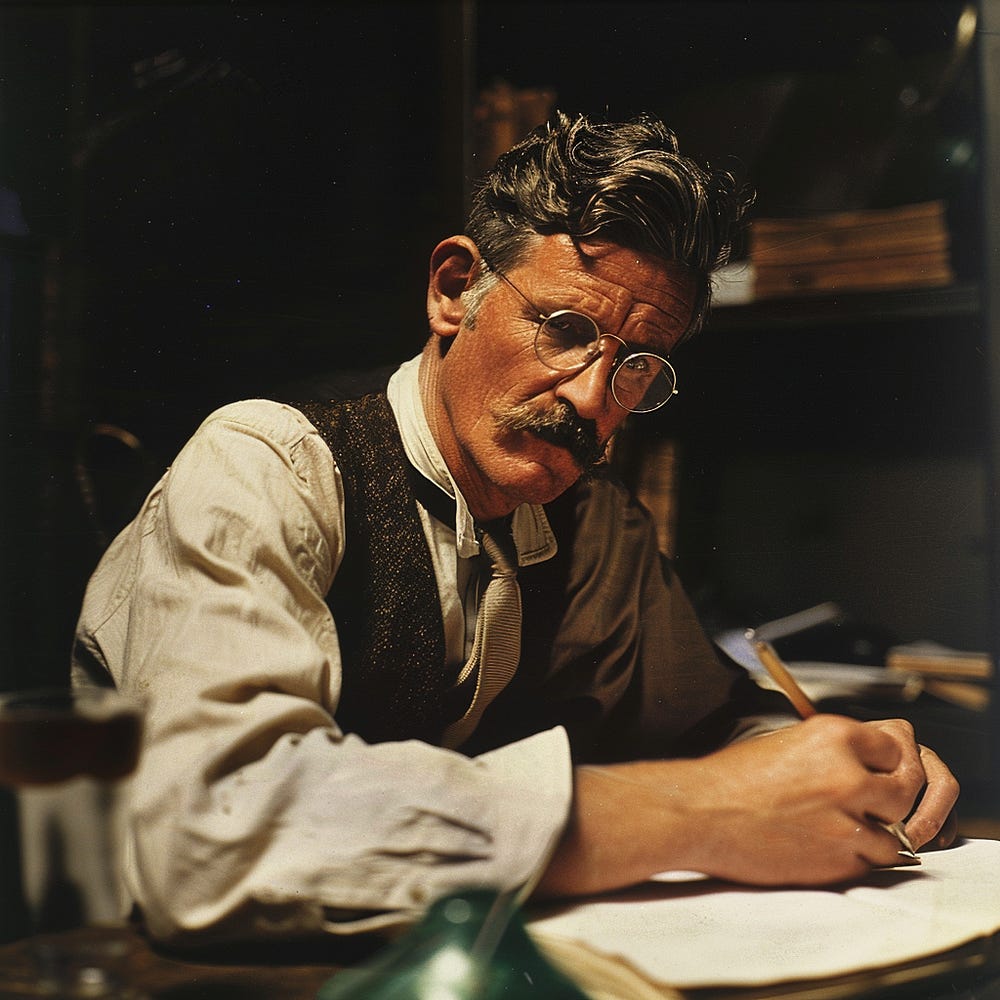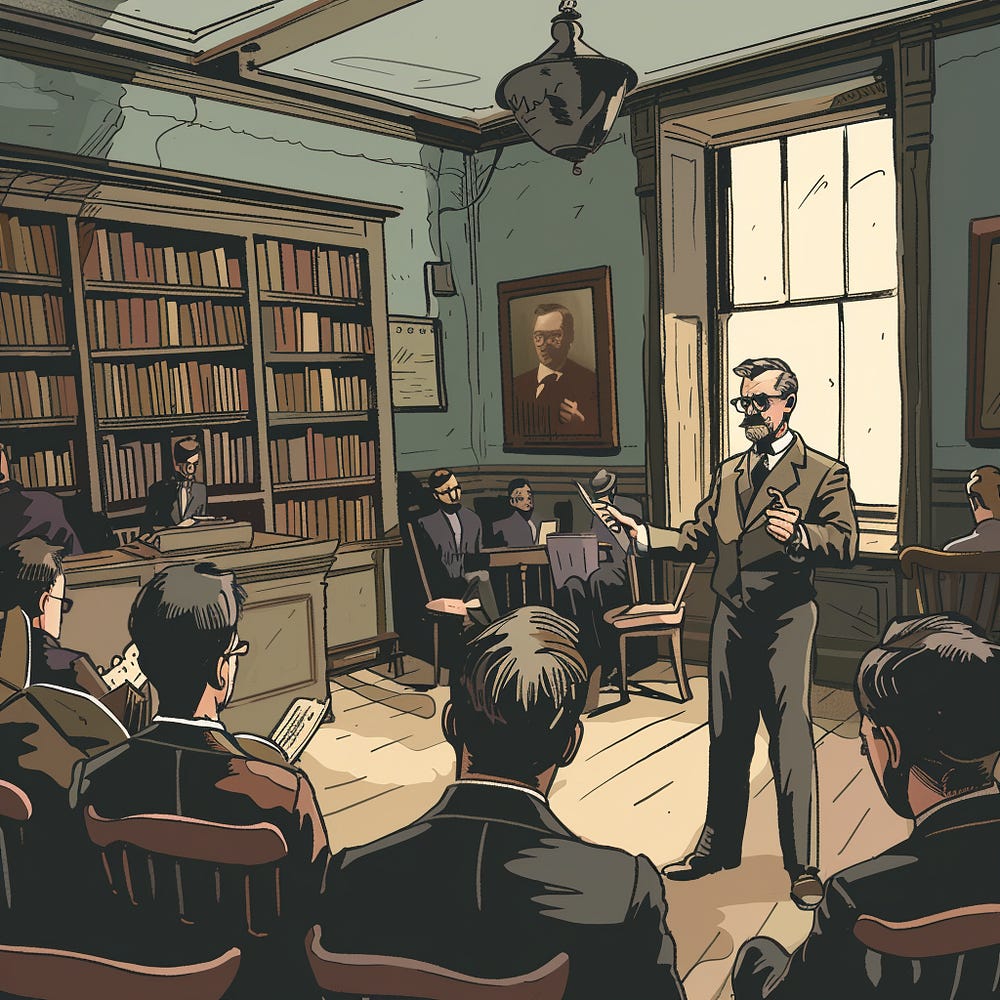What we’ll be talking about in this article:
James Joyce in my life
Write Dangerously
Don’t read reviews or literature
Achieve immortality
What can I possibly write about James Joyce that hasn’t been written before? Not much, although I can say that when his name was mentioned on RTE Radio when I was growing up, my grandmother would always, always, always, always say ‘that dirty feckin’ pervert!’
I was only a wee chap at the time so I didn’t really know who Joyce was, other than he’d been a famous Irish writer and it wasn’t until I was in secondary school that I got to learn a bit more about him. I read A Portrait of the Artist as a Young Man and while the vast majority of my schoolmates hated it, I thought it was pretty great.
Ulysses, oh man, that book’s a challenge. I worked with a Canadian lady many years ago and to get himself in the mood for Ireland, when her boyfriend was flying over he read Ulysses on the airplane. I asked him if was he disappointed with the Dublin he found compared to the Dublin Joyce wrote about. He said no and I still don’t know if that was a good or bad thing.
I eventually did ask my Gran why she thought Joyce was a pervert. “He was obsessed with sex and sh*te,” she told me. She was dead right in fairness to her.
Finnegans Wake beat me, it beat the crap out of me and it was one of those rare books that I couldn’t finish. I’ve no problem with putting a bad book down if it’s badly written or the story is muck but Finnegans Wake is a wholly different level of literature. A friend told me I must get Joseph Campbell’s A Skeleton Key to Finnegans Wake and read it alongside it. So, it’s on my list of things to read.
Write Dangerously
In the book “Conversations with James Joyce” written by Arthur Power. Joyce said “The important thing is not what we write but how we write, and in my opinion, the modern writer must be an adventurer above all, willing to take every risk, and be prepared to founder in his effort if need be. In other words, we must write dangerously”
Ah, sure look who couldn’t be inspired by that? I know when I’m writing fiction I sometimes find myself in a bind where a character is doing exactly what I want them to and I have to stop.
Why? Because the character then isn’t doing what they’d do, they’re doing what I’d do. So, I put them through challenges and hardships so that their character shines through. It’s an exhilarating challenge and great fun.
Don’t read reviews or literature
In a private letter to Fanny Gulliermet, Joyce wrote. “Writing in English is the most ingenious torture ever devised for sins committed in previous lives. The English reading public explains the reason why.”
It’s a little cryptic I’ll admit but what he was saying here was that because he put so much effort and craft into his writing, he detested being judged on it. He was his own harshest critic and he didn’t need the opinions of lesser mortals chiming in and bruising his ego. This isn’t to say you have to be an egotistical maniac but rather to have confidence in your writing.
I read recently somewhere about a top author who doesn’t use beta readers before releasing her books. Her opinion was along the lines of there being no point because readers aren’t writers and they don’t always know what good writing is.
He also said in another letter. ‘I have not read a work of literature for several years. My head is full of pebbles and rubbish and broken matches and bits of glass picked up ’most everywhere.”
Reading is dangerous according to Joyce. We run the risk of picking up fashions and habits from other writers. Granted we all love a good book or story but you’re going to find the best stories coming from within and not from external stimuli.
Achieve immortality
Once when asked about Ulysses he said. “I’ve put in so many enigmas and puzzles that it will keep the professors busy for centuries arguing over what I meant, and that’s the only way of ensuring one’s immortality.”
Joyce obviously loved to play with language and to break all the rules. Actually, not just break the rules but to take them and smash them into smithereens. He had a blatant disregard for the English language, how could we not love that? And his use of symbolism and veiled language means that almost 100 years after his death most of us still don’t have a bloody clue concerning what he was writing about.
We might think we know and there’s plenty of research out there concerning what is thought to be known but the only man that does know for certain is dead. And I reckon from reading Joyce, he’d get a good giggle out of that.
So, don’t be shy, go for it. Plaster your pieces of veiled imagery, symbolism, allegories, and analogies. Dare to confuse your readers by dangling carrots on sticks in front of them and trick them into thinking one way while the real meaning remains buried for them. This allows people to both find their own meaning in your words and to keep them guessing long after you’ve popped your clogs.
Hi, I’m Paddy. Thanks for reading my article on James Joyce.
I’m a counselor and spirituality teacher.
If you’d like to contact me regarding a counseling session or about writing, you can contact me here.
My different social media channels are here.




